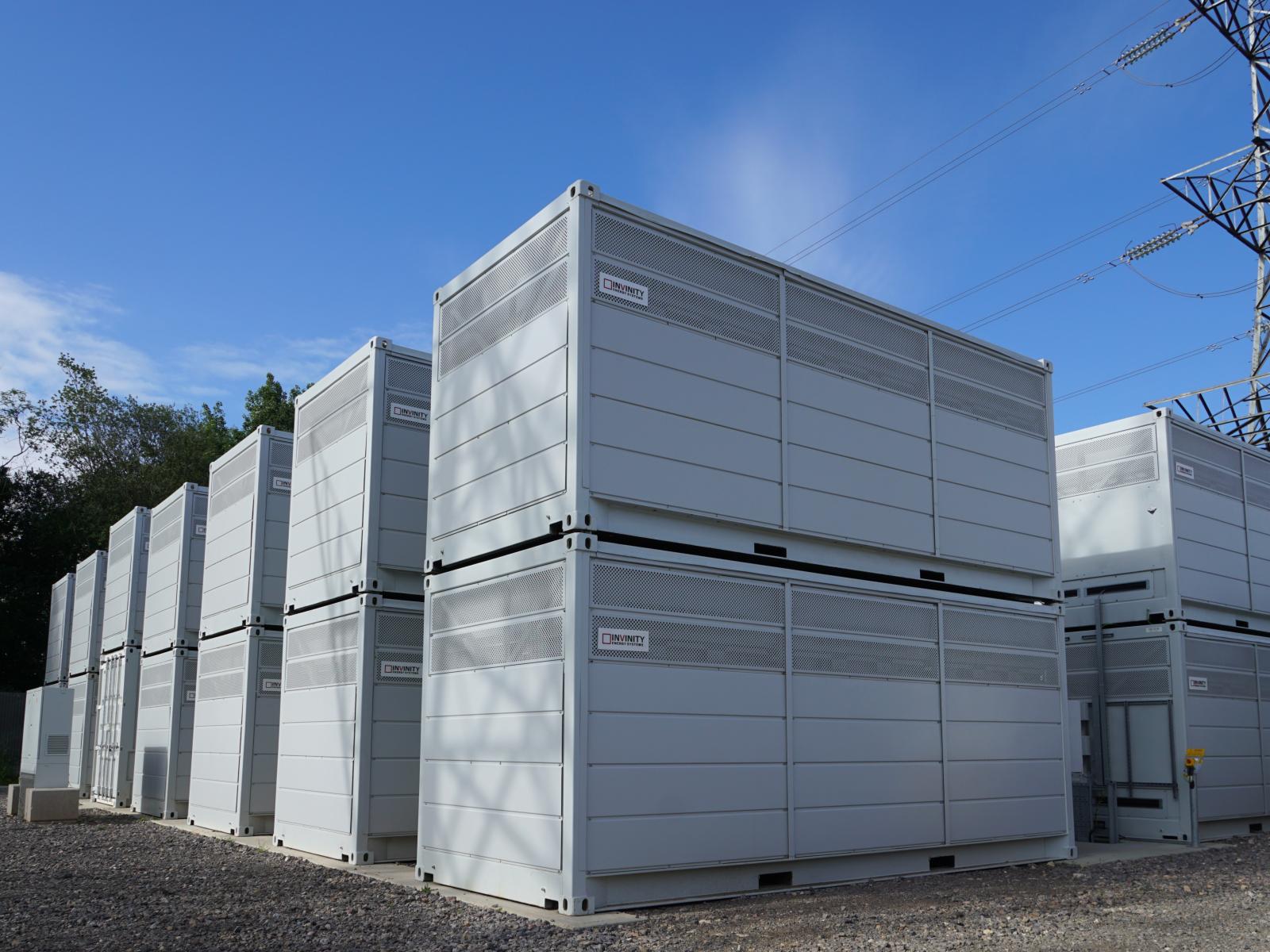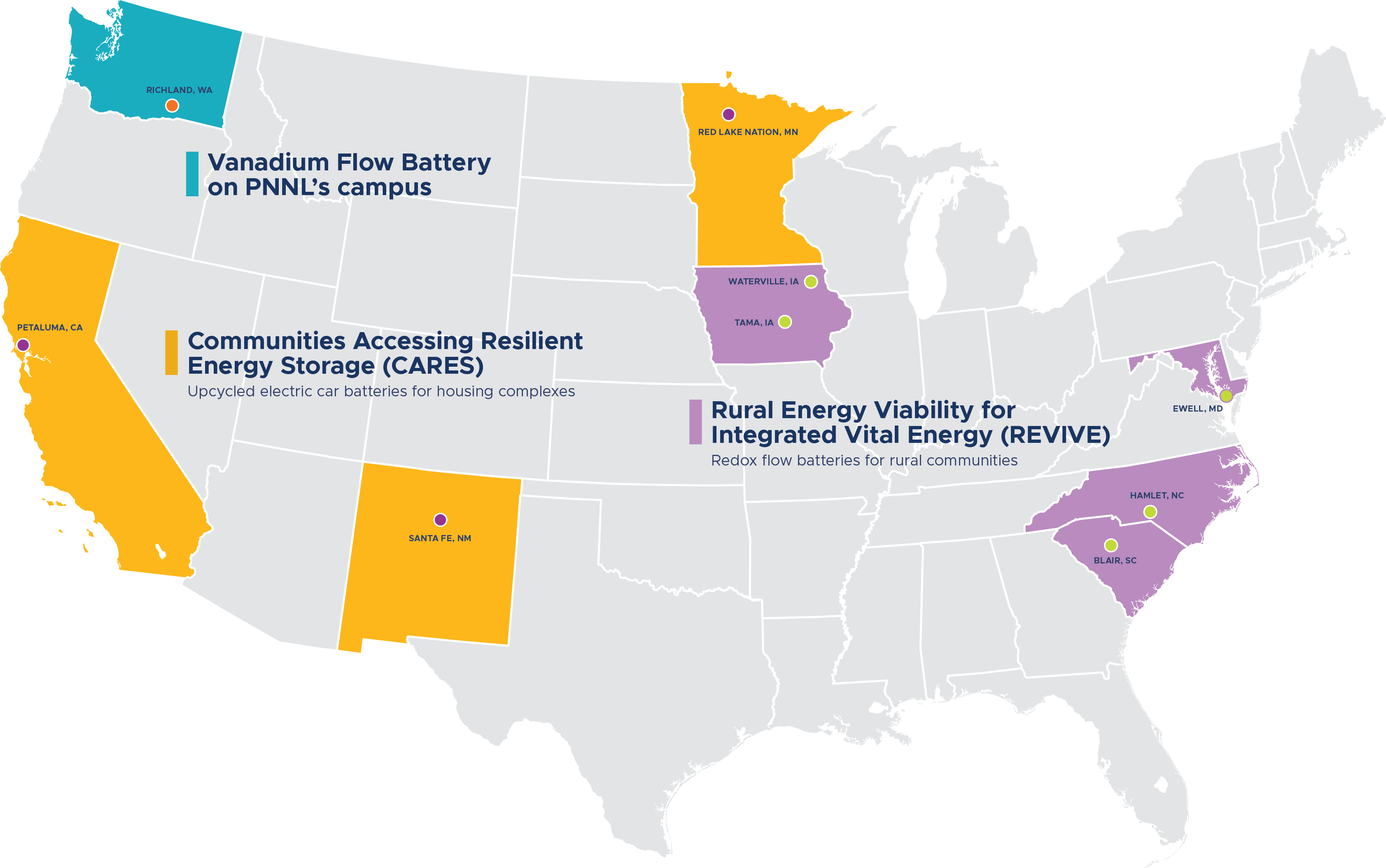PNNL to Install 24-Hour Flow Battery in Richland Campus
Battery will power critical loads, enhance resilience, and cut carbon emissions

PNNL will get a chance to evaluate the technical performance of a 525 kilowatt VRFB with 24-hours of peak discharge on its own campus. This project is made possible thanks to $10 million in funding from the U.S. Department of Energy’s (DOE) Office of Clean Energy Demonstrations (OCED). Invinity Energy Systems, a VRFB manufacturer, has been selected for the installation.
(Photo: Invinity Energy Systems)
Pacific Northwest National Laboratory (PNNL) has long been a preeminent leader in the research of flow batteries for grid-scale energy storage. Now, it will get a chance to evaluate the technical performance of a 525 kilowatt flow battery with 24-hours of peak discharge on its own campus.
“This addition to our campus represents a significant milestone in PNNL's commitment to grid resilience and its ongoing pursuit of our net-zero program goals,” said Kathleen Judd, technical lead for PNNL's NZERO initiative. “A battery that can provide power for as long as 24 hours will play an important role in enhancing our energy resilience, increasing flexibility, and reducing our energy costs, while also giving our researchers the opportunity to learn from the system’s operation.”
To prepare for site selection, the project team will first conduct an extensive engineering design to determine best location to support PNNL campus resiliency.
While commercial systems ranging from two to 12-hour discharges have been deployed and demonstrated in a number of existing projects, this is the first time a battery with 24-hour capacity will be deployed and tested in a field environment.
“The validation will de-risk the technology and encourage further investment and deployment from the industry, making it a promising solution for the growing demand for clean, reliable, and cost-effective energy storage systems,” said Di Wu, Chief Research Engineer at PNNL and lead researcher on the project.
Flow batteries are designed to store massive amounts of energy from renewable energy sources, such as wind and solar, for long periods. In addition to learning about how the technology performs, this project comes with some added benefits to PNNL’s operations, including enhancing campus resilience and helping PNNL get one step closer to achieving net-zero greenhouse gas emissions as part of the laboratory’s NZERO Initiative.
This project is made possible thanks to $10 million in funding from the U.S. Department of Energy’s (DOE) Office of Clean Energy Demonstrations (OCED). Invinity Energy Systems, a VRFB manufacturer, has been selected for the installation.
The proposal for the battery was a partnership between energy storage researchers and the operations and facilities teams at PNNL. The battery will sustain facilities with critical functions, such as material preservation and equipment maintenance, during prolonged power outages.
“We anticipate this project will help pave the way to broader commercial adoption of long-duration energy storage (LDES) for stakeholders with similar resilience, environmental, and economic goals,” said Vincent Sprenkle, energy storage expert at PNNL and director of the Grid Storage Launchpad (GSL), a new facility opening in 2024 dedicated to research and development of long-duration energy storage. “Not only will this system improve PNNL’s resiliency, but the performance and operational data from this project will help guide new LDES applications across the country.”
The GSL will accelerate the development of cheaper, greener, and better performing battery technology to bring the nation to closer to a decarbonized and resilient energy future and make more energy storage projects like this possible.

In addition to the flow batteries field validation on the PNNL campus, PNNL is also providing technical assistance and contributing their expertise in energy equity and storage to two additional projects funded by OCED. For the Rural Energy Viability for Integrated Vital Energy (REVIVE) project, the National Renewables Cooperative Organization and its project partners are bringing flow batteries to disadvantaged rural communities. For REVIVE, PNNL will carry out the techno-economic analyses and data collection for the project. Together with the PNNL Campus project, these efforts will generate the most comprehensive set of flow batteries operational data ever collected.
PNNL is also supporting the Communities Accessing Resilient Energy Storage (CARES) led by ReJoule, a second-life battery diagnostics and reuse company. The project will install upcycled electric car batteries in two affordable housing complexes in Petaluma, CA and a Red Lake Nation workforce development campus. For this project, PNNL will be conducting techno-economic analysis, life cycle analysis, and fire safety design assistance.
Published: November 27, 2023